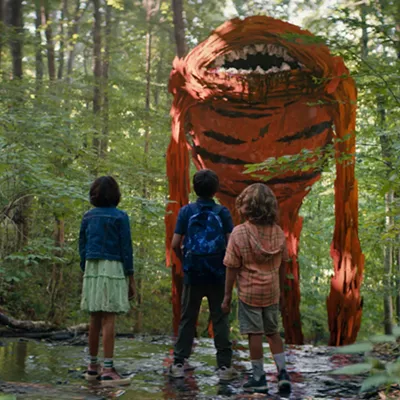Junebug begins strangely. At a gallery auction in Chicago, Madeleine (Embeth Davidtz) notices a man across the room, ignoring the buyers, fixated on a particular painting. He's pretty handsome, and she's captivated by the way he seems lost in the work. She slowly makes her way over to him in the crowded room and asks what he likes about the painting, which seems to be a na & iuml;ve rendering of a space ship. "It makes me happy," the man replies, then hesitates, pointing to a different, more abstract work, "but I'm going to buy that one."
The man is George (Alessandro Nivola), a & eacute;migr & eacute; to the city from rural North Carolina. Sometime during the opening credits, he and Madeleine marry. The next we see of them, they're driving their sensible Volvo wagon down some Carolinian highway. Turns out, the gallery belongs to Madeleine. She's a collector of outsider art and the two are making their way to meet David Wark (Frank Hoyt Taylor), who Madeleine believes may be the next big reclusive, primitivist painter. Bonus: He lives just a few miles away from George's parents (along with his little brother, who still lives at home, with his pregnant wife). You can smell all the familiar meet-the-family friction before they even reach the house. But Junebug isn't that kind of movie. What friction exists comes less from stereotyping than from expectation. Madeleine expects George's family to be like him. George's family expected George to marry a woman closer to his roots.
Conflicts in this film arise not out of pigheadedness, but -- hearkening to that spaceship in the opening scene -- from the alien nature of the environment Madeleine finds herself in. And for George's family, too, there is nothing so inexplicable as a self-made, independent career woman. George's mother sums up her initial reaction by saying, "She's too pretty," as though that were the worst character flaw imaginable. What the film offers are not ludicrous fish-out-of-water moments or huge fights, but a series of tentative steps toward understanding. In this film, failure and success both come in the quietest of moments.
Every actor leaves a strong impression. Frank Hoyt Taylor is luminous as David Wark, whom the townspeople begin to refer to as "the retarded artist" when he pays a visit to Madeleine. Taylor bends his voice into the strangest, deepest accent imaginable. He's a strangely lucid backwoods prophet, with paradoxical values and an undeniable sense of purpose. You spend five minutes trying to figure out if what he's saying is even English, then the rest of the film wishing he had more lines.
Benjamin McKenzie (the kid from The OC), though, gives the film's best performance. He plays George's brother Johnny, one of the most fascinating characters I've ever seen on film. He's taciturn and neglectful of his wife Ashley's (Amy Adams) most basic needs and feelings, but when a show comes on TV he knows she'll like, he launches into a mad scramble to record it for her, screaming upstairs for her to come watch. When he fails either to record the show or to get her in front of the television, he explodes with impotent rage, like he wants to connect but doesn't know how.
We never know why Johnny is the way he is, just that he is. The more violently and erratically he acts out, though, in the face of the most trivial things, the more McKenzie makes us believe there's no one reason for his character's troubles. No cataclysmic trauma. Just a lot of pain and a profound sense of failure.
Junebug's great strength lies exactly there, in the immediacy of the script. There are no grand soliloquies, no explanatory asides, no flashbacks, no tearful confessions. There are only people getting to know other people, in the moment, with all that entails. There's a stark, isolated beauty in the act of discovery here. It's the kind of thing you'll be hard-pressed to find anywhere else, let alone in the sentimental and denigrating tone these kinds of indie films often take.
It's a delicate film, in the end. Though the characters are bawdy and opinionated and troubled, Junebug itself negotiates a tense peace between its disparate factions that, in the end, could be mistaken for resolution. It's not that, though. Madeleine screws up big, committing what amounts to a cardinal sin in the eyes of George and his clan. We can't totally blame her, though. No one has really taken the time to explain things to her, least of all George. The film ends with something far more complicated than mere resolution. It's closer to a stalemate and, in that sense, it's almost like life.













